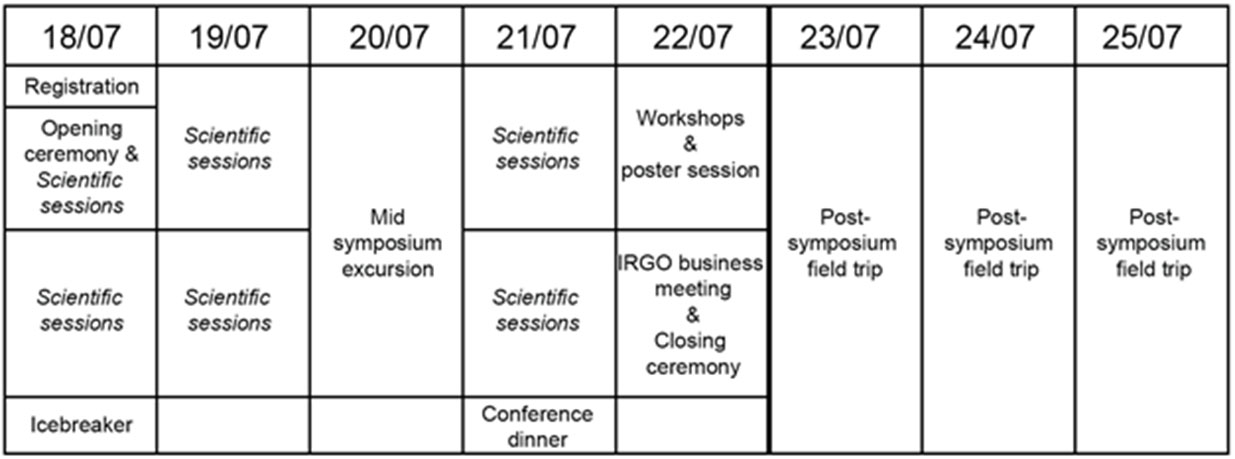Program
The Symposium will consist of oral sessions, poster sessions and workshops. Mid- and post-symposium field-trips are also planned.
Scientific sessions
- Origin and evolution of ostracods: Crustacean and ostracod evolution, origin and taxonomy of fossil ostracods.- Ecology and biology of Recent ostracods: New advances in the ecology and biology of Recent marine and freshwater ostracods.
- Ostracod biogeography and biodiversity: Studies on the geographical and temporal distribution of fossil and Recent ostracods.
- Ostracods in the Anthropocene: Ostracods as proxies for environmental monitoring and historical palaeoenvironmental reconstruction.
- Methods in ostracodology: New or advanced methods for the study of ostracods.
- Pleistocene non-marine Ostracoda:
Non-marine ostracods are amongst the most versatile and significant microfossils of Pleistocene sediments. They help to decipher palaeoclimatic changes, support reconstructing environmental changes, and have potential for biostratigraphy. Association, morphometric, stable isotope and shell chemistry analyses are the methods to use these bioindicators and proxies. Many examples of applications in Quaternary Geology, palaeobiogeography, geoarchaeology, and geo-hazard research can be found in scientific publications of the last decades. Methods in this field, evolving fast and interdisciplinary approaches, are almost a standard today. The session gives an overview on methods and actual case studies involving Pleistocene Ostracoda. Proposed by Anna Pint & Peter Frenzel, Friedrich-Schiller-Universität Jena, Germany
This session is dedicated to Roland Fuhrmann, the Nestor of Quaternary ostracod research in Central Germany, who passed away in 2020.
The organizers and the scientific committee may combine or open sessions depending on the range and focus of the contributions received.
Workshops
The future of Ostracodology organised by Marie-Béatrice Forel, Cristianini Trecastro Bergue, Moriaki YasuharaMore than one year ago, we launched a call on Ostracon to a community-scale reflection on emerging and important questions in the field: what do we identify today as the big questions of the next years for ostracodology? We received numerous questions that deal with very diverse fields of our discipline and illustrate the importance of sharing our views on the important challenges we, ostracod researchers, should address next. This workshop will aim at continuing this discussion around larger thematic we identified from the submitted questions. All participants are welcome to join the discussion, including online, and the email address to send additional questions (ohmyostracod@gmail.com) will remain active until the day of the workshop. We hope that this workshop can result in a group publication illustrating our community reflection on what is ostracodology in 2022, its emerging topics and big challenges to come.
Towards a standardised protocol in sampling and processing ostracods from soft bottom habitats organised by Peter Frenzel & Anna Pint
Ostracoda are a versatile tool in Quaternary palaeo-science and have a high potential for conservational palaeobiology as well. Making results from ostracod analyses comparable needs standardised methods in sampling, processing and analyses. Those are already existing for Foraminifera in form of the FOBIMO protocol, making them fit for their use in biomonitoring. Certainly, the community of ostracod researchers needs a similar approach to make a step forward towards the systematic use of ostracods in water quality research and related fields of study. We present suggestions for a standardised protocol and want to discuss it with you in order to produce a thoroughly considered guideline useful for our research community.
Workshop proposals are welcome before March 31st 2022 (please, address the proposals to iso2022@univ-lyon1.fr. They will be examined by the Organizing Committee).